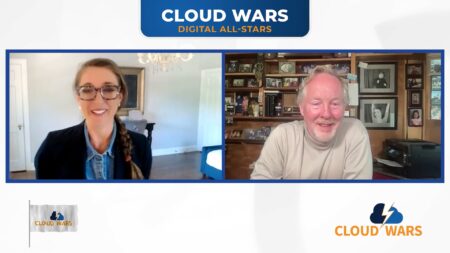As competition among top cloud vendors intensifies, customer success is rapidly emerging as a strategic differentiator far more important than snazzy technology.
It seems dazzlingly obvious: we all want our customers to be successful, right? But the enterprise-tech industry hasn’t always earned a sterling reputation for delivering that type of outcome: complex products, difficult integrations, multiple versions, painful upgrades, promises exceeding reality, and the need for armies of technical experts to keep it all fed and watered and, generally, up and running.
Cloud computing is changing the expectations of customers and the requirements for cloud vendors—and as the cloud continues to move rapidly into the mainstream of global business, a new board-level agenda item has exploded onto the scene: customer success.
Don’t confuse this with customer satisfaction, which is nice, or customer loyalty, which is wonderful—customer success is an entirely different beast, and any cloud vendor that doesn’t prize customer success as a core and top-priority imperative will fail.
If it’s a small cloud vendor that can’t deliver customer success, it will die quickly. If it’s a big cloud vendor that can’t deliver customer success, it will die slowly. But regardless of the timeframe, the end result is the same: the ultimate collapse.
Here’s why: in the old days, tech vendors made the stuff, worked out a deal with a customer, received a check and stuffed it in the bank, and then dropped the stuff off the customer’s loading dock and said, “Thanks, and if there’s any problem, don’t call us—it’s your property now, and any problems are your problems. Good luck.”
Customers were boxed in: they could rant and rave at the vendors who did business that way, but the cost of switching to a different vendor—and most alternatives would operate pretty much exactly the same way—was so high and so painful and so time-consuming that most customers would stick with the incumbent out of necessity rather than by choice. After all, purchases are permanent.
But the cloud flips that inevitability upside-down precisely because of the impermanence of the relationship: the customer rents the service (let’s say a SaaS application) for 3 years, and if that customer’s experience during that 3-year run isn’t a good one, then it’s relatively easy these days to switch to another vendor.
And if the cloud incumbent really wants that customer to renew the subscription, and if that cloud vendor really wants to reap the financial rewards of keeping existing customers rather than constantly battling the churn for new ones, then that cloud vendor will—from the moment the deal is signed—do everything possible to ensure that the customer judges the experience to be a success on every level:
- the service works, and works well;
- the service did exactly what it was promised to do;
- the service delivered the business value the customer wanted and needed; and
- the customer’s business was more successful as a result of using the cloud service.
Now, some tech vendors would probably say, “Wait—that’s always been my philosophy—for me, the cloud hasn’t changed anything!” If they tell you that, just bear in mind that old line from the cop in “Hill Street Blues” who said, “Just because you put your boots in the oven, that don’t make ’em biscuits.” Saying and doing are two very different things.
And that’s why it’s interesting to examine not just what some cloud vendors are saying today, but also what they are in fact doing with regard to this new imperative of customer success.
Every cloud vendor is striving to have existing customers sign up for renewals and to enlist those happy souls as enthusiastic references to help win new customers. Here are the CEOs of Salesforce, Workday and ServiceNow explaining in their own words why customer success has become a top priority.
 Salesforce.com CEO Marc Benioff: “Nothing is more important to Salesforce than customer success even though about half of our 27,000 employees today probably weren’t with us two years ago.
Salesforce.com CEO Marc Benioff: “Nothing is more important to Salesforce than customer success even though about half of our 27,000 employees today probably weren’t with us two years ago.
“That’s something we really spend time with them on because when you’re in enterprise software, you have to realize that it’s hard work and not everything’s going to be perfect all the time and there are going to be problems.
“And that’s why I believe being so committed to the customer is more important than it’s ever been, and I think that’s really why you’re going to see extraordinary growth from us for years to come because it’s really this culture that’s driving us forward.”
Workday CEO Aneel Bhusri: “I think we’re starting to see a ‘network effect’ of the Fortune 500 companies talking to each other and comparing notes on which solutions work, and which ones don’t…. If you stay very focused on customers and customer success, people pay attention to that—and in turn, they also want that same type of success.”
ServiceNow CEO John Donahoe: “We’re going to put more focus on customer success, so that we’re capturing and documenting and codifying the business value that gets created, which helps a CIO or an IT department within their organization demonstrate the value they are driving inside their company and frankly helps us on upsells, on price realization and on landing new accounts.”
And here are some parallel thoughts on the surging value of customer success from top executives at Microsoft, SAP and Oracle:
Microsoft CFO Amy Hood: “The one thing I care differently about this year than I think in the past is, we’re really focused on Azure consumption as opposed to just the billing cycle, which is an important distinction. You always recognize revenue based on consumption—you don’t get to recognize revenue just for selling something… So that’s why I’m pretty wedded to the concept that this is a different way that we should be rewarding our people, because it’s more cleanly aligned structurally to customer success. And ultimately in a consumption-based business, customer success is all that matters, because it builds on itself over time.”
SAP CEO Bill McDermott: “As it relates to the cloud and how I think you could really think about the incentives to the sales force, we’ve created an environment where it really matters that those go-lives and that customer success is the most important priority and that’s also now reflected heavily in the compensation for the sales rep as well as the whole management value chain. So for us, a ‘customer for life’ is much more a focus on the sales department side. We didn’t take anything away from them, but we made it very clear that we’re really interested in dynamite go-lives for our customers who then give raving references.”
Oracle executive vice-president of applications Steve Miranda:“When we are now running our customers’ businesses as part of our cloud, that’s literally what we’re doing: we are running their business. We are much more intimate partners with our customer, and we’ve introduced brand new roles like Customer Success Managers, Implementation Success Managers, Customer Feedback Programs. Because when the customer gets the software now, really we are incented and we work with our customers to get live and get successful, and I think that’s what you’ve seen with the results going forward.”
So here’s a suggestion for one of the really smart analyst firms: create a “Cloud Customer Success Scorecard” that shows business buyers which cloud vendors are delivering not just great technology but something even more important: enduring and high-value performance that makes customers winners in their markets, and heartfelt zealots for that cloud vendor’s brand.
*******************
RECOMMENDED READING FROM CLOUD WARS:
The World’s Top 5 Cloud-Computing Suppliers: #1 Microsoft, #2 Amazon, #3 Salesforce, #4 SAP, #5 IBM
Amazon Versus Oracle: The Battle for Cloud Database Leadership
As Amazon Battles with Retailers, Microsoft Leads Them into the Cloud
Why Microsoft Is #1 in the Cloud: 10 Key Insights
SAP’s Stunning Transformation: Qualtrics Already “Crown Jewel of Company”
Watch Out, Microsoft and Amazon: Google Cloud CEO Thomas Kurian Plans To Be #1
The Coming Hybrid Wave: Where Do Microsoft, IBM and Amazon Stand? (Part 1 of 2)
Oracle, SAP and Workday Driving Red-Hot Cloud ERP Growth Into 2019
*********************
Subscribe to the Cloud Wars Newsletter for twice-monthly in-depth analysis of the major cloud vendors from the perspective of business customers. It’s free, it’s exclusive, and it’s great!








